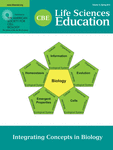Addressing the Challenge of Diversity in the Graduate Ranks: Good Practices Yield Good Outcomes
Abstract
In this paper, we examine the impact of implementing three systemic practices on the diversity and institutional culture in biomedical and public health PhD training at Brown University. We hypothesized that these practices, designed as part of the National Institutes of Health–funded Initiative to Maximize Student Development (IMSD) program in the Division of Biology and Medicine, would have a positive effect on underrepresented minority (URM) recruitment and retention and objective measures of student success. These practices include: 1) develop strategic partnerships with selected undergraduate institutions; 2) provide a personalized education program of student support and skill-based modules to supplement discipline-based course work; and 3) transform institutional culture by engaging faculty in supporting diversity-related goals and practices. Data comparing URM numbers and key academic milestones before and after implementation of IMSD practices support the initial hypothesis and effectiveness of these practices at Brown. Program components are broadly applicable as best practices for others seeking to improve URM recruitment and achievements of graduate students traditionally underrepresented in the sciences.



